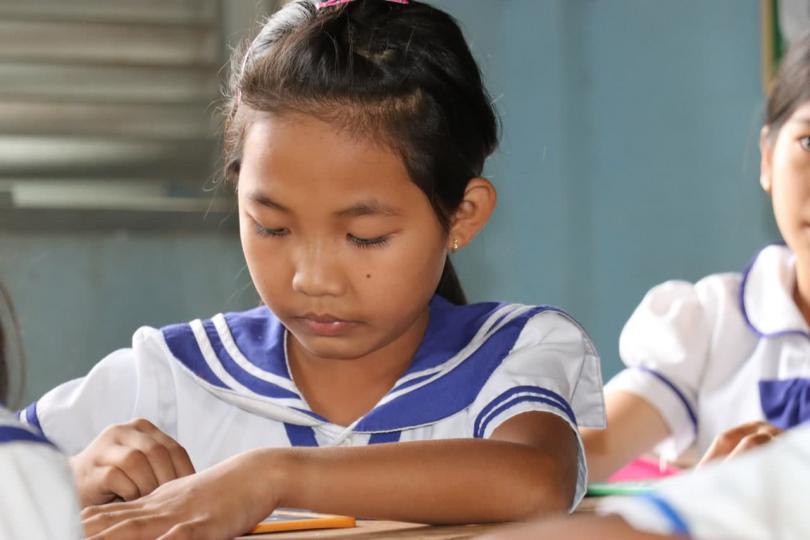Improving Literacy
Sok Kimleng, a 10-year-old girl, studying in grade 4 at Angkor Phnom Khlong primary school, happily shared how she felt after improving Khmer literacy while studying at the Save the Children-supported school. “I never felt bored in class,” Kimleng stated, “because I found the materials my teacher used exciting.”
Kimleng and her two younger siblings live with their aunties and disabled grandfather in a small wooden house in an urban community in Koh Kong province, Cambodia. Her parents have been living and working as a cleaner and construction worker in Preah Sihanouk province since she was just three years old. “I have never felt the warmth from my family because they rarely come to visit me,” Kimleng said.
She continued, telling us how difficult it was to live far away from her parents because she is responsible for taking care of her grandfather and youngest sister and has to do household chores such as cooking and washing clothes. Because of this, Kimleng struggled to find time to study at home and go to school. “Kimleng did not regularly come to school, and I found it difficult to support her literacy and numeracy for the first semester,” Ms. Touch, Kimleng’s teacher, said.
With funding from the Norwegian Agency for Development Cooperation (Norad), Save the Children and its local and government partners (Koh Kong Provincial Office of Education and the District Office of Education) began implementing the Basic Education Program in Kimleng’s community in early 2019. The project provides training to teachers and school directors on developing teaching and learning materials and teaching methodologies for children with diverse learning needs.
After received training from the project, Ms. Touch put her new skills and methodologies into practice, by developing picture cards, literacy cards and other tools to support Kimleng. “I enjoyed my teacher’s teaching style because she often read us short stories and played games related to our lesson,” Kimleng expressed.
Ms. Touch has noticed Kimleng’s Khmer literacy improve. Now she is able to read and write difficult words and solve mathematics problems in class. Kimleng’s learning outcomes have improved to such an extent that she is able to help teach her friends. “Kimleng can help her class learn to write the vocabulary for dictation sessions,” Ms. Touch continued “As a result, they all got higher scores. In particular, Kimleng can expand her skills in reading, writing and spelling.
Kimleng can now write long text narratives with only minor mistakes, participate in group work with her classmates, and be more involved in school activities. Kimleng is becoming an outstanding student in the class.
With an enthusiastic smile, Kimleng tells us that she wants to be a teacher when she grows up.





